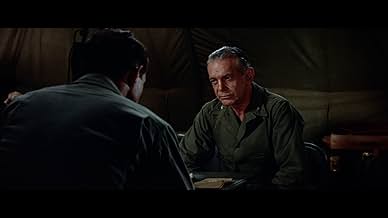A platoon of marines led by callow, idealistic Lieutenant Hearn (Cliff Robertson) and battle-hardened, cynical Sergeant Croft (Aldo Ray) are sent on a dangerous recon mission by vainglorious but insecure General Cummings (Raymond Massey). Published shortly after the end of the war, Norman Mailer's book was a crude, unflinching, and critical view of war in the Pacific theatre. The much more superficial movie version, released 10 years later, returns to the usual Hollywood redemptive war narrative in which the good, while they may suffer, are ultimately rewarded, and the bad, while they may seem to succeed, are ultimately punished. The movie limits the book's philosophical dialogue between egalitarian Hearn and rank-conscious Cummings but then tacks on a final 'uplifting' exchange that is not (and could not be) in the book. The marine platoon is a little less stereotypical than in earlier war-era films but the soldiers still seem more like 'characters' than people. Ray is good as hard-assed Sgt. Croft (although the character has been toned down a bit from Mailer's sadistic sociopath). The film's combat scenes are a mixed bag: the scenes of fighting between the platoon and the Japanese defenders aren't bad (although the marines seem to be able to lob a hand-grenade pretty far), but the 'showpieces' rely largely on non-period footage and equipment (with the Japanese using easily recognizable American equipment). While pre-CGI filmmakers can be forgiven for not always being historically correct, I tend to watch these kinds of films for the 'combat' scenes and find the anachronisms distracting and disappointing. By the end of the 1950's, despite the Cold War jingoism, there were a number of good antiwar films but the producers of this film seem to have been unwilling to give vision to Mailer's harsh voice. Note: there are a number of IMDB reviewers more familiar with the book than I who have commented in depth about the differences between the two versions (which inevitably includes 'spoilers').


































